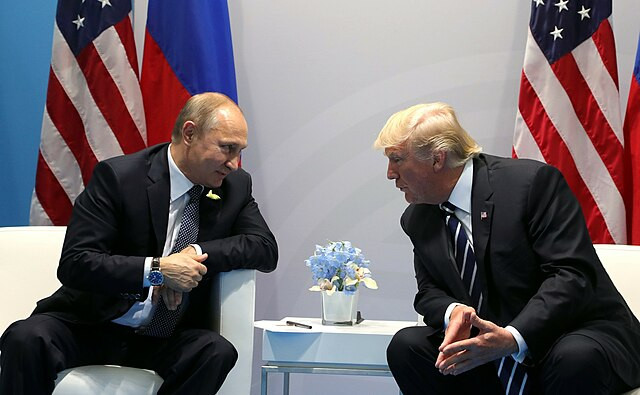President-elect Donald Trump, fresh off a decisive electoral victory, reportedly advised Russian President Vladimir Putin not to escalate the war in Ukraine during a phone conversation last Thursday, according to multiple sources familiar with the exchange. The Washington Post first reported the conversation, noting that it marked the first interaction between the two leaders since Trump reclaimed the presidency.
The call, placed from Trump's Florida residence, is said to have centered on maintaining stability and peace in Europe. Trump also reminded Putin of the substantial U.S. military presence in the region, a point intended to underscore Washington's continued strategic interest in European security.
While Trump's transition team neither confirmed nor denied the specifics, spokesperson Steven Cheung said in a statement via Fox News, "We do not comment on private calls between President Trump and other world leaders. President Trump won a historic election decisively and leaders from around the world know America will return to prominence on the world stage. That is why leaders have begun the process of developing stronger relationships with the 45th and 47th president because he represents global peace and stability."
Trump's re-engagement with Putin raises significant questions about his approach to the ongoing conflict in Ukraine. Throughout his campaign, Trump emphasized a swift resolution to the war, claiming he could end it "within a day" without detailing his strategy. Analysts suggest the incoming president may want to avoid escalating tensions at the outset of his second term. A former U.S. official familiar with the call remarked, "Trump likely does not want to begin his presidency with a worsening Ukraine conflict."
The Trump-Putin exchange is part of a broader effort by the president-elect to recalibrate U.S. foreign policy in response to ongoing global crises. On Wednesday, Trump held his first post-election call with Ukrainian President Volodymyr Zelenskyy. Media reports indicate that billionaire Elon Musk participated in the conversation, reflecting the SpaceX CEO's influence within Trump's orbit. Details of Musk's role remain unclear, though sources suggest he reiterated his commitment to supporting Ukraine through the Starlink satellite network, which has been crucial to the nation's wartime communications.
Zelenskyy took to social media to acknowledge the discussion, posting, "I had an excellent call with President Trump and congratulated him on his historic landslide victory-his tremendous campaign made this result possible." However, specifics on future U.S. military aid to Ukraine were not disclosed.
Amid Trump's return to the international stage, current President Joe Biden's administration remains focused on ensuring a smooth transition of power. National Security Adviser Jake Sullivan said Sunday that Biden plans to meet with Trump at the White House, emphasizing America's commitment to stability in Europe and continued support for Ukraine.
In contrast to Trump's stance, Biden has advocated sustained aid to Kyiv, warning that "walking away from Ukraine means more instability in Europe." Since Russia's invasion in February 2022, the U.S. has committed tens of billions of dollars in military and economic support for Ukraine-a policy Trump has frequently criticized alongside some congressional Republicans.
Despite Ukraine's ongoing challenges, Kyiv's foreign ministry disputed claims that it was informed of Trump's call with Putin in advance, describing reports as "false" and stressing that Ukraine did not endorse or oppose the conversation. "Reports that the Ukrainian side was informed in advance of the alleged call are false," ministry spokesperson Heorhii Tykhyi told Reuters.
The Kremlin, meanwhile, has signaled a willingness to engage with Trump on the conflict, though Putin has maintained strict conditions for ending the war, including Ukraine abandoning its NATO ambitions and ceding control of occupied regions. Such terms remain unacceptable to Ukraine, with Zelenskyy's administration pushing a "victory plan" that hinges on continued Western support.
Trump's foreign policy outreach extended beyond Europe in recent days. On a call with German Chancellor Olaf Scholz, the two leaders agreed to pursue peace efforts in Europe. Trump also engaged with South Korean President Yoon Suk Yeol, discussing cooperation in shipbuilding and regional stability in Asia-Pacific.
As Trump prepares to re-enter the Oval Office, questions linger about his approach to Russia and Ukraine. Bryan Lanza, a political adviser to Trump, recently suggested that Kyiv should prioritize peace over reclaiming occupied territories-a remark the Trump campaign quickly distanced itself from, asserting that Lanza does not speak for the president-elect.






